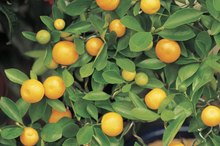Watery Stool, Diarrhea, Gas, Bloating & Fiber in Food
Eating enough fiber in your diet helps maintain bowel regularity, but if you’re eating too much fiber you may develop unwanted digestive symptoms. Watery stools, diarrhea, gas and bloating are all side effects of consuming too much fiber, according to MedlinePlus 1. If you’re eating the recommended daily amount of fiber and you expereince these symptoms, you may have a more serious condition, such as irritable bowel syndrome or celiac disease 23.
Too Much Fiber
Harvard School of Public Health states that the average American only consumes about 15 grams of fiber daily. The recommended daily dose is between 20 and 35 grams of fiber depending on your age and gender. If you recently increased your fiber intake, these symptoms may last one to three days, until the bacteria in your gut become accustomed to the amount of fiber you consume daily.
- Harvard School of Public Health states that the average American only consumes about 15 grams of fiber daily.
- If you recently increased your fiber intake, these symptoms may last one to three days, until the bacteria in your gut become accustomed to the amount of fiber you consume daily.
Cause
Why Does Bulgur Wheat Cause Bloating?
Learn More
Having a moderate amount of gas is normal, but if you develop excessive amounts of gas after eating fiber-rich foods, you may develop gas pains, bloating and diarrhea. Gas forms when harmless bacteria in your colon interact with the fiber, creating various vapors. If the vapors become trapped in your digestive system, you will develop sharp pains in your abdomen and your stomach will swell. Too much fiber can cause your stools to become watery and loose because of the sudden increase of roughage. Talk with your doctor about lowering the amount of fiber you’re currently consuming, and then slowly increase fiber back into your diet.
- Having a moderate amount of gas is normal, but if you develop excessive amounts of gas after eating fiber-rich foods, you may develop gas pains, bloating and diarrhea.
- Too much fiber can cause your stools to become watery and loose because of the sudden increase of roughage.
Irritable Bowel Syndrome
Chronic diarrhea, accompanied by gas, watery stools and bloating may be a sign of irritable bowel syndrome 2. Some people with IBS are sensitive to fiber, which may trigger common symptoms. IBS is an everyday condition that mainly affects women starting in their 30s, with long-term digestive problems, according to PubMed Health. If you have IBS the muscles in your colon either move too rapidly or too slowly, resulting in diarrhea or constipation. Other symptoms of this condition include stomach pain, cramping and gas.
- Chronic diarrhea, accompanied by gas, watery stools and bloating may be a sign of irritable bowel syndrome 2.
- Some people with IBS are sensitive to fiber, which may trigger common symptoms.
Celiac Disease
Benefiber & Bloating
Learn More
If you experience these symptoms only after eating whole grains, you may have a condition called celiac disease 3. Celiac disease is an autoimmune disorder where your immune system attacks the lining of your intestines whenever you consume foods that contain gluten 3. Gluten is a protein primarily found in wheat, rye and barley.
Related Articles
References
- MedlinePlus: Fiber
- PubMed Health: Irritable Bowel Syndrome
- MayoClinic.com: Celiac Disease
- Liu L, Wang S, Liu J. Fiber consumption and all-cause, cardiovascular, and cancer mortalities: A systematic review and meta-analysis of cohort studies. Mol Nutr Food Res. 2015;59(1):139-46. doi:10.1002/mnfr.201400449
- Academy of Nutrition and Dietetics. Fiber. November 2018.
- MedlinePlus. Soluble vs. insoluble fiber. Updated April 9, 2020.
- Lyon M, Kacinik V. Is there a place for dietary fiber supplements in weight management? Curr Obes Rep. 2012;1(2):59-67. doi:10.1007/s13679-012-0016-9
- Drugs.com. Fiber capsules side effects. Updated February 14, 2020.
- McRorie J. Evidence-based approach to fiber supplements and clinically meaningful health benefits, part 1. Nutr Today. 2015;50(2):82-89. doi:10.1097/nt.0000000000000082
- Jalanka J, Major G, Murray K et al. The effect of psyllium husk on intestinal microbiota in constipated patients and healthy controls. Int J Mol Sci. 2019;20(2):433. doi:10.3390/ijms20020433
- Drugs.com. Citrucel (methylcellulose) drug interactions. Updated April 2020.
- American Family Physician. Management of constipation in older adults. September 2015.
- Drugs.com. Polycarbophil. Updated September 9, 2019.
- Lambeau KV, McRorie JW Jr. Fiber supplements and clinically proven health benefits: How to recognize and recommend an effective fiber therapy. J Am Assoc Nurse Pract. 2017;29(4):216–223. doi:10.1002/2327-6924.12447
Writer Bio
Diane Marks started her writing career in 2010 and has been in health care administration for more than 30 years. She holds a registered nurse license from Citizens General Hospital School of Nursing, a Bachelor of Arts in health care education from California University of Pennsylvania and a Master of Science in health administration from the University of Pittsburgh.









